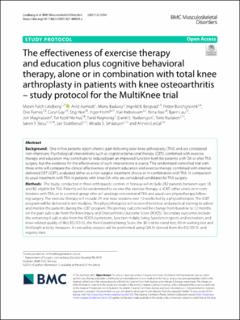The efectiveness of exercise therapy and education plus cognitive behavioral therapy, alone or in combination with total knee arthroplasty in patients with knee osteoarthritis – study protocol for the MultiKnee trial
Lindberg, Maren Falch; Aamodt, Arild; Badawy, Mona; Bergvad, Ingvild Buset; Borchgrevink, Petter Chr.; Furnes, Ove Nord; Gay, Caryl; Heir, Stig; Holm, Inger; Indrekvam, Kari; Kise, Nina Jullum; Lau, Bjørn; Magnussen, Jon; Nerhus, Tor Kjetil; Rognsvåg, Turid; Rudsengen, Daniil; Rustøen, Tone; Skou, Søren Thorgaard; Stubberud, Jan Egil; Småstuen, Milada Cvancarova; Lerdal, Anners
Journal article, Peer reviewed
Published version

Åpne
Permanent lenke
https://hdl.handle.net/11250/2942369Utgivelsesdato
2021Metadata
Vis full innførselSamlinger
- Department of Clinical Medicine [2066]
- Registrations from Cristin [9791]
Sammendrag
Background
One in five patients report chronic pain following total knee arthroplasty (TKA) and are considered non-improvers. Psychological interventions such as cognitive behavioral therapy (CBT), combined with exercise therapy and education may contribute to reduced pain an improved function both for patients with OA or after TKA surgery, but the evidence for the effectiveness of such interventions is scarce. This randomized controlled trial with three arms will compare the clinical effectiveness of patient education and exercise therapy combined with internet-delivered CBT (iCBT), evaluated either as a non-surgical treatment choice or in combination with TKA, in comparison to usual treatment with TKA in patients with knee OA who are considered candidates for TKA surgery.
Methods
The study, conducted in three orthopaedic centers in Norway will include 282 patients between ages 18 and 80, eligible for TKA. Patients will be randomized to receive the exercise therapy + iCBT, either alone or in combination with TKA, or to a control group who will undergo conventional TKA and usual care physiotherapy following surgery. The exercise therapy will include 24 one hour sessions over 12 weeks led by a physiotherapist. The iCBT program will be delivered in ten modules. The physiotherapists will receive theoretical and practical training to advise and mentor the patients during the iCBT program. The primary outcome will be change from baseline to 12 months on the pain sub-scale from the Knee Injury and Osteoarthritis Outcome Score (KOOS). Secondary outcomes include the remaining 4 sub-scales from the KOOS (symptoms, function in daily living, function in sports and recreation, and knee-related quality of life), EQ-5D-5L, the Pain Catastrophizing Scale, the 30-s sit-to-stand test, 40-m walking test and ActiGraph activity measures. A cost-utility analysis will be performed using QALYs derived from the EQ-5D-5L and registry data.
Discussion
This is the first randomized controlled trial to investigate the effectiveness of exercise therapy and iCBT with or without TKA, to optimize outcomes for TKA patients. Findings from this trial will contribute to evidence-based personalized treatment recommendations for a large proportion of OA patients who currently lack an effective treatment option.
